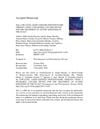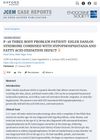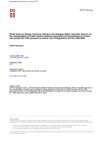 27 citations,
March 2018 in “Allergy and asthma proceedings”
27 citations,
March 2018 in “Allergy and asthma proceedings” People with alopecia areata often have higher rates of allergies and autoimmune diseases.
 3 citations,
October 2021 in “Brain Sciences”
3 citations,
October 2021 in “Brain Sciences” Long-term use of Risperidone may be linked to a serious skin condition in bipolar patients, affecting their overall well-being.
 November 2019 in “Harper's Textbook of Pediatric Dermatology”
November 2019 in “Harper's Textbook of Pediatric Dermatology” The document is a detailed medical reference on skin and genetic disorders.
 6 citations,
November 2018 in “Photodiagnosis and Photodynamic Therapy”
6 citations,
November 2018 in “Photodiagnosis and Photodynamic Therapy” A wearable cap-like device using light therapy reduced scalp skin lesions by 71% and was painless.
 November 2023 in “Heliyon”
November 2023 in “Heliyon” A woman got a serious eye infection after a hair loss treatment due to improper procedure.
 10 citations,
July 2002 in “Australasian Journal of Dermatology”
10 citations,
July 2002 in “Australasian Journal of Dermatology” Careful management of blood thinners is crucial for lupus patients with APS.
31 citations,
October 1992 in “Archives of Dermatology” The man's scalp condition did not improve with tetracycline treatment.
 November 2011 in “Australasian Journal of Dermatology”
November 2011 in “Australasian Journal of Dermatology” Cellulite may be linked to low adiponectin, isotretinoin with UVB can treat psoriasis effectively, permanent alopecia post-chemotherapy resembles a unique hair loss, deodorants may cause fragrance allergies, desmoplastic melanoma is becoming more common, and intensive UVB treatment can give long-term psoriasis remission.
 18 citations,
October 2013 in “EFSA Journal”
18 citations,
October 2013 in “EFSA Journal” Coriander seed oil is safe for healthy adults at up to 600 mg per day.
 January 2023 in “Bio web of conferences/BIO web of conferences”
January 2023 in “Bio web of conferences/BIO web of conferences” The document concludes that specific dermoscopic features can help diagnose different facial red skin conditions.
2 citations,
January 2010 in “Side effects of drugs annual” Dermatological drugs and cosmetics can cause serious side effects like cancer, allergies, and heart issues.
 21 citations,
September 2018 in “International journal of women’s dermatology”
21 citations,
September 2018 in “International journal of women’s dermatology” People with Lichen planopilaris are more likely to have certain autoimmune and endocrine disorders but less likely to have conditions like allergies and diabetes.
 16 citations,
September 2020 in “British journal of dermatology/British journal of dermatology, Supplement”
16 citations,
September 2020 in “British journal of dermatology/British journal of dermatology, Supplement” The article suggests that targeting specific immune pathways could help control and treat the skin disease hidradenitis suppurativa.
 November 2023 in “Journal of Cosmetic Dermatology”
November 2023 in “Journal of Cosmetic Dermatology” The topical treatment with caffeine and Procapil 3% improved male pattern hair loss and was well tolerated after 12 weeks.
 January 2025 in “JCEM Case Reports”
January 2025 in “JCEM Case Reports” Enzyme replacement therapy may help alleviate symptoms in complex cases like this.
 14 citations,
April 2014 in “Medical Clinics of North America”
14 citations,
April 2014 in “Medical Clinics of North America” The document concludes that quick referral and appropriate treatments are crucial for managing common skin conditions and preventing permanent damage.
 November 1999 in “Australasian Journal of Dermatology”
November 1999 in “Australasian Journal of Dermatology” The document concludes that there is a need for more research and regulation in dermatology, covering topics like latex allergy in children, the use of botulinum toxin, and treatments for skin conditions.
 July 2003 in “Pediatrics in review”
July 2003 in “Pediatrics in review” In 2001, the FDA approved 12 new drugs for children to treat allergies, asthma, ADHD, birth control, and other conditions.
 3 citations,
June 2011 in “EFSA Journal”
3 citations,
June 2011 in “EFSA Journal” Spermidine's effect on hair growth is not proven.
 52 citations,
February 2006 in “Archives of Dermatology”
52 citations,
February 2006 in “Archives of Dermatology” Alefacept may effectively treat severe lichen planus, with patients showing significant improvement and no side effects.
 3 citations,
June 2023 in “Frontiers in medicine”
3 citations,
June 2023 in “Frontiers in medicine” Oxidative stress may contribute to hair loss in alopecia areata and antioxidants could potentially help as a treatment.
 April 2024 in “Journal of asthma and allergy”
April 2024 in “Journal of asthma and allergy” Abrocitinib effectively treated severe atopic dermatitis and mild alopecia areata in a 12-year-old boy after dupilumab failed.
 August 2007 in “Journal of Investigative Dermatology”
August 2007 in “Journal of Investigative Dermatology” The meeting discussed vitamin D3's role in fighting tuberculosis, potential treatments for skin conditions like psoriasis, and hair follicle regeneration as a possible solution for hair loss.
 October 2001 in “WORLD SCIENTIFIC eBooks”
October 2001 in “WORLD SCIENTIFIC eBooks” Many substances, including chemicals and metals, can cause skin reactions; careful handling and identification of allergens are crucial to prevent dermatitis.
 April 2018 in “Journal of Investigative Dermatology”
April 2018 in “Journal of Investigative Dermatology” Desmoglein 3 organization in cell connections changes without calcium, affecting cell adhesion.
 1 citations,
April 2018 in “Journal of Investigative Dermatology”
1 citations,
April 2018 in “Journal of Investigative Dermatology” People respond differently to hair loss treatment with PRP because of individual differences in growth factors from platelets.
 21 citations,
July 2022 in “Orphanet journal of rare diseases”
21 citations,
July 2022 in “Orphanet journal of rare diseases” New treatments for ichthyosis, like protein replacement and gene therapy, show promise and may become standard care.
 January 2011 in “Side effects of drugs annual”
January 2011 in “Side effects of drugs annual” Tretinoin gel is safe for sun exposure, but tacalcitol doesn't significantly improve non-segmental vitiligo.
 52 citations,
January 1999 in “Journal of Small Animal Practice”
52 citations,
January 1999 in “Journal of Small Animal Practice” Removing a cat's pancreatic cancer can temporarily reverse hair loss caused by the disease.
 5 citations,
April 2021 in “Frontiers in Pharmacology”
5 citations,
April 2021 in “Frontiers in Pharmacology” Using minoxidil-coated microbubbles with ultrasound significantly boosts hair growth.




























